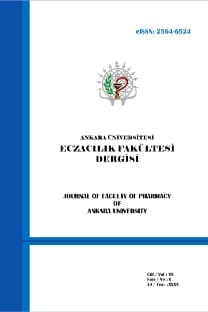EVALUATION OF THE IMPACT OF A PHARMACEUTICAL CARE PROGRAM ON PATIENTS WITH ASTHMA : ASTIM HASTALARI ÜZERİNDE “FARMASŐTİK BAKIM” PROGRAMININ ETKİSİNİN DEĞERLENDİRİLMESİ
Bu araştırmanın amacı astım hastaları üzerinde “Farmasőtik bakım” programının etkisinin değerlendirilmesidir. Çalışmada, astım hastalarına yönelik geniş kapsamlı bir eğitim ve izleme programı hazırlandı. Programa hastalıkla ilgili esas bilgiler, hastalığın belirtileri ve bu belirtilerin tam olarak yorumlanması, farmakoterapi bilgileri, inhalerlerin uygulanması tekniğinin değerlendirilmesi ve program kapsamındaki astım hastalarının yaşam kalitesinin ölçülmesi bilgileri dahil edildi. Program birkaç Sofya eczanesinde uygulandı. Seçilmiş ve belirlenmiş olan eczanelerden ilaçlarını satın alan astım hastaları (18 – 80 yaş arasında) gözlem altına alındı. Bu hastalar, hastalıklarının esası, farmakoterapi, hastalıkla başa çıkma ve doğru inhaler tekniği konusunda eğitim kursuna devam ettiler. Denemenin başında ve sonunda 08/02/2002S versiyonlu yaşam kalitesini değerlendiren bir tablo (QLS) uygulandı. Kişiler arası ve sosyal ilişkiler, mesleksel meşguliyet ve diğer ikincil önem taşıyan belirtiler konusunda farmasötik bakım programından yararlanan hastalarda elle tutulur bir iyileşme kaydedilmiştir. Uygulanan eğitimden sonra spirometrik değerlerde oldukça önemli değişiklikler gözlenmiştir
EVALUATION OF THE IMPACT OF A PHARMACEUTICAL CARE PROGRAM ON PATIENTS WITH ASTHMA
The objective of this study was to evaluate the impact of a pharmaceutical care program on patients with asthma. A broad asthma education and monitoring program that includes basic asthma knowledge, symptoms and accurate evaluation, pharmacotherapy assessment including inhaler technique and quality of life measurement was developed and applied in several pharmacies in the city of Sofia, Bulgaria. Patients with moderate asthma, visiting regularly the pharmacies for purchasing their drug treatment were allocated to the intervention. These patients were educated on their disease, pharmacotherapy, self-management, and inhalation techniques. The quality of life scale (QLS) version 08/02/2002 was applied at the beginning and in the end of the experiment to assess the quality of life. Spirometry was done every month. There was a significant improvement in the patients that received pharmaceutical care in terms of the individual domains of interpersonal and social work, occupational role functioning and other residual symptoms. There were considerable changes in the spirometric values after the education
